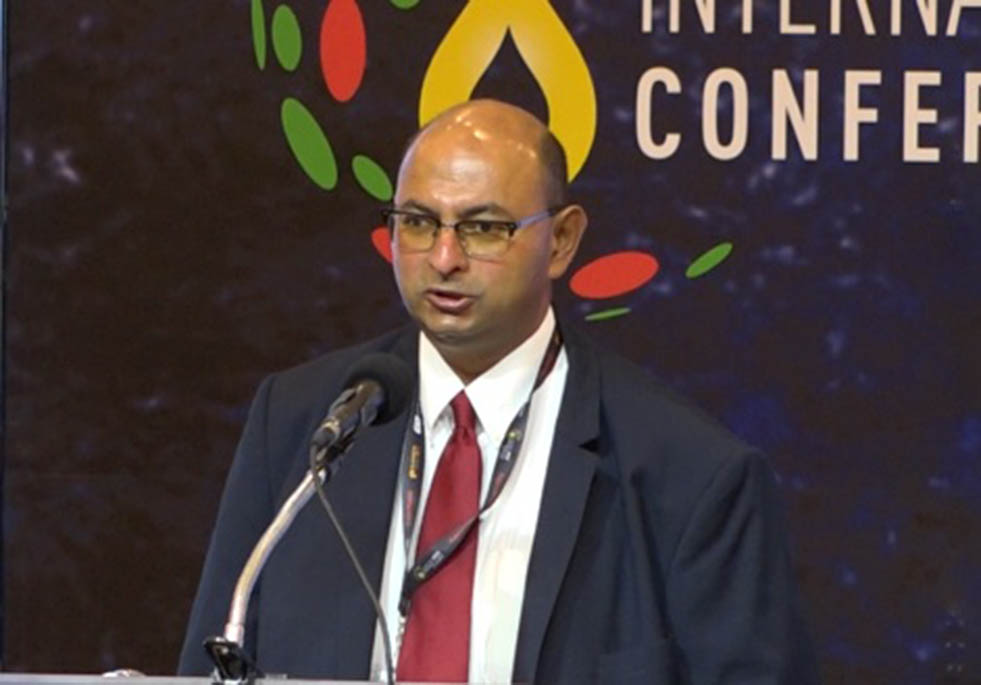Government is hoping that it can conclude negotiations with China Railway Group Limited on the Amaila Falls Hydropower Project (AFHP) with the intention of starting construction by the third quarter of 2022, according to the head of the gas-to-shore taskforce Winston Brassington.
“We are currently engaging with China Rails in negotiations for this project to start by the third quarter of this year…,” Brassington said during a presentation on the project at the international oil and gas conference here on Thursday.
The AFHP, previously pegged at US$858.1 million, had been the flagship project of the PPP/C government when it was in power pre-2015. However, then opposition A Partner-ship for National Unity (APNU) and the Alliance For Change (AFC) had used their joint one-seat majority to halt the project.
Once in government in 2015, the APNU+AFC coalition scrapped the project, citing costs and other concerns, while signalling that it was focusing on an energy mix with natural gas as a prime component. A Norconsult report, which was meant to be a final study of the project and commissioned under the Guyana-Norway partnership, was generally favourable towards the venture but the APNU+AFC government interpreted it differently.
After taking back the seat of power in 2020, the Irfaan Ali-led PPP/C government resuscitated the project with a renewed focus. The government changed the conditions of the project to the Build-Own-Operate-Transfer (BOOT) model, where the company will supply electricity to the Guyana Power and Light (GPL) Inc at a cost not exceeding US$0.07737 per kWh.
The government claims that the AFHP will lower the cost of electricity needed to power Guyana’s economic diversification and transformation into a low carbon economy, as well as reduce the cost of power to businesses and households. The project will also support initiatives such as the electrification of transport and e-mobility and accelerate the development of a robust ICT sector needed as well as a competitive manufacturing sector.
The proposed Summary of Scope of Works detailed in a Request For Proposals included a 165 MW installed hydro dam, plant, and related works; Trans-mission Line and Structures: 270 KM double-circuit 230 KV from Amaila to Sophia; 230 KV Substations in Linden and Sophia; Creation of a 23 square KM storage reservoir; upgrades and completion of roads and bridges to the site (85 KM new; 122 KM existing); and assumption of all geotechnical risks including guarantees relating to the structure of the reservoir, dam, and transmission towers.
During his presentation on Thursday, Brassington said that China Railway was selected because of its capability to execute the project as well as its longstanding relationship with the AFHP.
“By way of background, China Rail is not new to this process. They were the selected EPC contractor back in 2012, when Blackstone, who was the then sponsor, selected them based on an international tender. So China Rail’s familiarity with this project, with Guyana, has been significant as many of us in Guyana would know when Blackstone withdrew from the project in August of 2013 the remaining parties in the project agreed to have China Railway step up as a sponsor,” he explained.
He further related that the government did not hand China Railway the project; rather, it went through a public tendering process. He said that the government would have provided the interested bidders with all of the 2012 documents inclusive of the power purchase agreement, the receivables agreement, the implementation agreement which outlines the government obligations and the EPC contract. Additionally, the interested bidders also received copies of all of the feasibility studies – technical, geotechnical, hydrological, environmental – along with hydro licence and environmental permits.
In the end, four bids were received – three Chinese companies and one Brazilian firm.
“So we provided everything to every potential party who was interested. They had all of this information and that is what they use to submit their proposals. We had two options. We picked the BOOT option at the end of the day. So we are not owning a project…. The project will be owned by the project company and they will be selling the power to GPL on the power purchase agreement,” he said.
“We picked China Rail because they had the lowest…it will be funded by China Rail and Chinese institutions. They will own the project. This project will be operated under a concession for 20 years and at the end of those 20 years the project will be handed over to the government at no cost,” Brassington added.
Brassington added that the 20-year concession is a significant achievement since the project’s life span can reach up to 100 years, which means that the government would be in a position to provide cheaper power to citizens.
Based on the proposal submitted by China Railway, the total capital cost is estimated at around US$700 million with the actual engineering, procurement and construction price pegged at US$500 million while the remainder of the sum goes towards developmental and supervision costs among other ancillary expenses.
Brassington also told the conference that government intends to recruit an independent supervisory firm to ensure that the project is built to specification and in conformity with international standards.
“We also agreed that we will have an international O&M operator so when it’s built we will have someone who will be competent to operate this… We will have an independent supervision firm and the government will issue the hydro licence once they’ve completed all of the proper permitting submissions and the EPA will issue the environmental permit once they’ve submitted that and the government is not guaranteeing the project they are going to guarantee the performance of GPL.
“The sponsor will obtain political risk insurance and the sort of things and the sponsor will have an EPC contract to build this and we used the same EPC contract that was developed by Blackstone from 2012. This is an internationally, an international contract that was vetted by experts and negotiated over a long period between 2010 and 2012,” the former NICIL head related.
He made it clear that all of the risks associated with the project would be taken only by China Railway.






